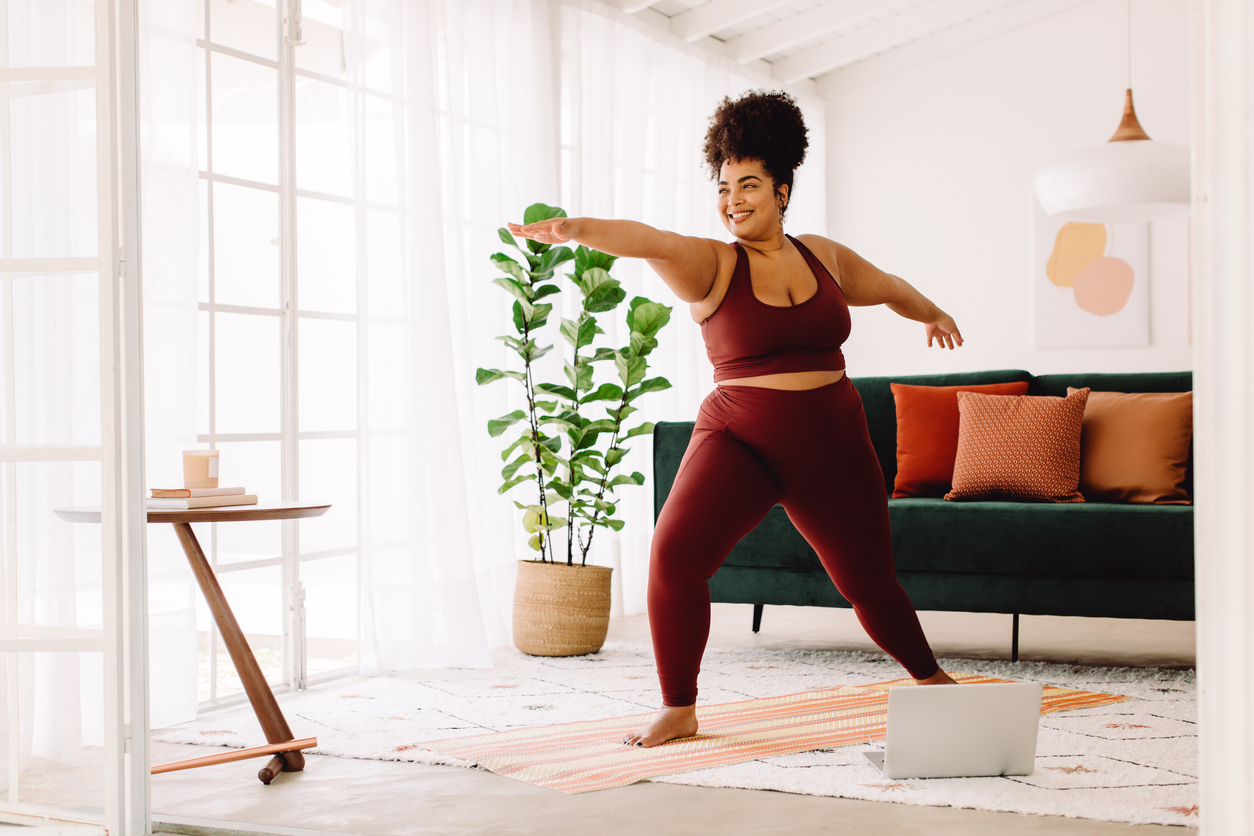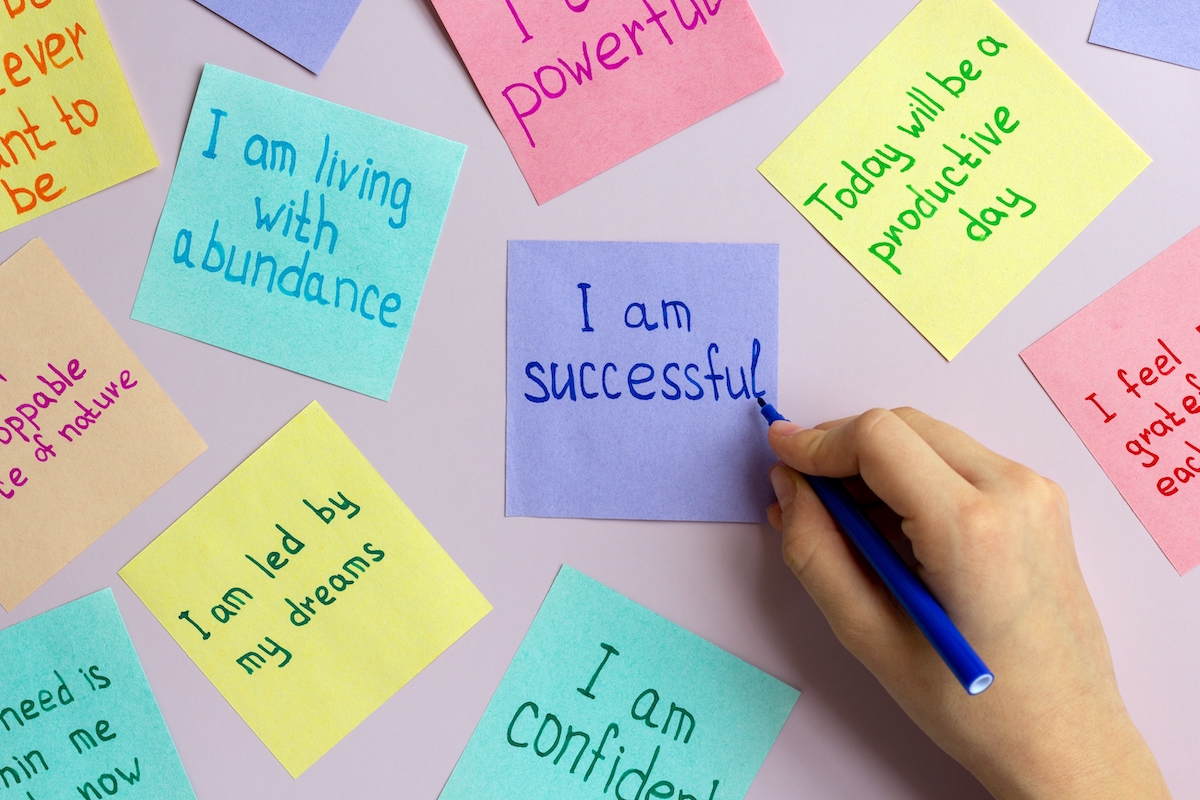10 Ways to Feel Calm and Happy (That Aren’t Meditation)

Meditation can be a powerful tool for lowering your stress levels and increasing your feelings of happiness. However, as mental health experts are quick to point out, it’s not the only tool, and it doesn’t work for everyone. By adding more mental wellness weapons to your arsenal, you’ll be better able to cope with those inevitable moments of overwhelm, anxiety, or discomfort. Read on to learn experts’ top 10 ways to feel calm and happy without meditation.
RELATED: 8 Affirmations to Feel Ridiculously Happy Every Day in Retirement.
1
Make art with your non-dominant hand.

For many people, art provides a feeling of therapeutic release. Nilou Esmaeilpour, MSc, a registered clinical counselor at Lotus Therapy, suggests adding a twist by drawing, painting, or writing with your non-dominant hand.
“Using your non-dominant hand forces you to slow down and concentrate on the task at hand. It can be a playful and freeing experience, opening up new pathways in the brain and offering a break from routine thinking patterns,” she explains.
The counselor adds that it may also help you see the world from a fresh perspective, which fosters more creativity, openness, and, subsequently, relaxation.
RELATED: 7 Simple Things You Can Do Right Now to Turn a Bad Mood Around.
2
Keep a journal.

Journaling is another tool that can help you feel calm and happy—especially if you focus on the positive as you write.
“Create a gratitude journal with a twist by using artistic elements like sketches, collages, or even digital media,” advises Brent Metcalf, LCSW, a social worker, therapist, and owner of Tri-Star Counseling. “Expressing gratitude through creative means reinforces positive emotions. As you focus on the things you’re thankful for and translate them into visual form, you reinforce the neural pathways associated with happiness and contentment.”
Similarly, Esmaeilpour suggests keeping a journal of your random acts of kindness, however big or small they may be.
“Challenge yourself to perform unexpected acts of generosity for others,” she says. “By actively reflecting on these actions in a journal, you reinforce the positive emotions associated with kindness and empathy.”
RELATED: 7 Journaling Tips to Feel Happy Every Day in Retirement.
3
Try “nature bathing.”

Immersing yourself in natural environments is another great way to boost your mood and lower your stress levels. Esmaeilpour recommends finding ways to commune with nature daily, even if you live in a city.
“Connecting with nature, even in small doses, has been proven to reduce stress hormones and increase feelings of well-being. It can help you feel more grounded and connected to the world around you, providing a break from the hustle and bustle of urban living,” she tells Best Life.
If a hike in the woods or a swim in a lake aren’t currently in the cards, Esmaeilpour suggests going to a local park, cultivating a windowsill garden, or tending to indoor plants.
Another way to get a dose of nature at home is to listen to recordings of calming nature sounds, such as gentle rain, ocean waves, or birdsong, says Metcalf.
“These sounds have a soothing effect on the nervous system, promoting relaxation and reducing stress. The auditory experience transports your mind to natural settings, offering an escape from daily worries,” he notes.
4
Find time to play.

Next, Esmaeilpour suggests setting aside time for play.
“Play is not just for children; it’s a vital aspect of human creativity and relaxation. Engaging in playful activities can bring joy, reduce stress, and reconnect you with a simpler, more intuitive way of being,” she says.
While there’s no wrong way to play, she recommends coloring, playing simple games, or engaging in playful physical activities like jumping rope or hula hooping in particular.
RELATED: 9 Easy Ways to Instantly Feel Happier on a Rainy Day, Experts Say.
5
Try this exercise.

Working out can have a huge impact on your mental health, says Jay Trambadia, PsyD, a licensed clinical psychologist.
“Regular exercise is linked to the release of endorphins, which are natural mood lifters,” he tells Best Life. “Physical activity also reduces stress hormones and can improve your overall sense of well-being.”
While anything that gets your heart rate up should have an impact, Metcalf says that there’s one type of exercise that’s more beneficial than the rest: laughter yoga.
“This is a technique that involves intentional laughter exercises without relying on humor or jokes,” the therapist explains. “When you laugh, your body releases endorphins, which are natural mood lifters. Engaging in laughter yoga helps you break free from self-consciousness, promotes social bonding, and triggers genuine feelings of happiness.”
RELATED: 8 Simple Exercises That Will Make Your Joints Feel Better.
6
Strengthen your social ties.

If you’re looking to feel happy and calm, it’s also essential to nurture your connections to others, says Trambadia. In fact, according to a 2007 study published in the journal Psychiatry, strong social support networks are crucial to both our physical and mental health.
“Overall, it appears that positive social support of high quality can enhance resilience to stress, help protect against developing trauma-related psychopathology, decrease the functional consequences of trauma-induced disorders, such as post-traumatic stress disorder (PTSD), and reduce medical morbidity and mortality,” the study authors write.
7
Try positive affirmations.

Positive self-affirmations can transform our self-image, making us feel more at peace.
“Our minds believe what we tell them to believe,” says Mallory Grimste, LCSW, a mental health therapist specializing in working with teenagers. “Affirmations are a great way to adjust our thoughts to a more positive or beneficial way of thinking. It’s important to keep in mind we can’t always control our automatic thinking responses, but we can practice repeating, or affirming, other more helpful ways of thinking.”
Affirmations can also help you “bridge the gap” between bad and good feelings, says Grimste.
“An easy way to bridge the gap from where we are now to where we want to be is to combine validation and affirmations with the words ‘even though,'” she shares.
Here’s the template: “Even though (insert uncomfortable experience or thought), I am (insert affirmation you’re working towards).” For instance, you might say, “Even though I am grieving a difficult loss, I can still find some joy or purpose in each day.”
RELATED: 8 Daily Affirmations to Send Your Confidence Skyrocketing.
8
Self-soothe when you need to.

Grimste says that it’s also important to tend to your physical responses to stress when times get tough.
“This is one of my favorite strategies for feeling calmer and happier,” she says. “Tuning in to your current body signals or responses will give you clues on how to soothe that response. For example, when I am upset, my throat gets very dry and feels like there’s a lump forming. By taking a drink of cool water, my throat relaxes and I feel better. Some other examples of self-soothing are watching a comfort show, wearing a piece of clothing that feels cozy, listening to music that puts you in a good mood, and so much more.”
9
Focus on sleep.

Getting a poor night’s sleep can make everything feel harder—and the effects can be compounded if you have chronically poor sleep habits. According to the Centers for Disease Control and Prevention (CDC), most adults should aim for seven to nine hours of sleep per night, though many of us fall short of this goal.
That’s why experts recommend focusing on your sleep hygiene by setting regular sleep and wake times, preparing your bedroom for sleep, eating well, exercising, and turning off devices early.
“Quality sleep is crucial for emotional regulation. Poor sleep can contribute to irritability, mood swings, and decreased overall well-being,” warns Trambadia.
For more wellness advice delivered straight to your inbox, sign up for our daily newsletter.
10
Limit multitasking.

The modern world demands that we constantly maximize our efficiency—even in our downtime. For example, you may feel that it’s not enough to knit, that you should also be listening to a podcast or reading the news while enjoying your favorite pastime.
However, Trambadia says that devoting yourself to one activity at a time can make you feel significantly calmer and happier.
“Focusing on one task at a time can lead to a greater sense of accomplishment and reduced stress compared to multitasking,” he notes.